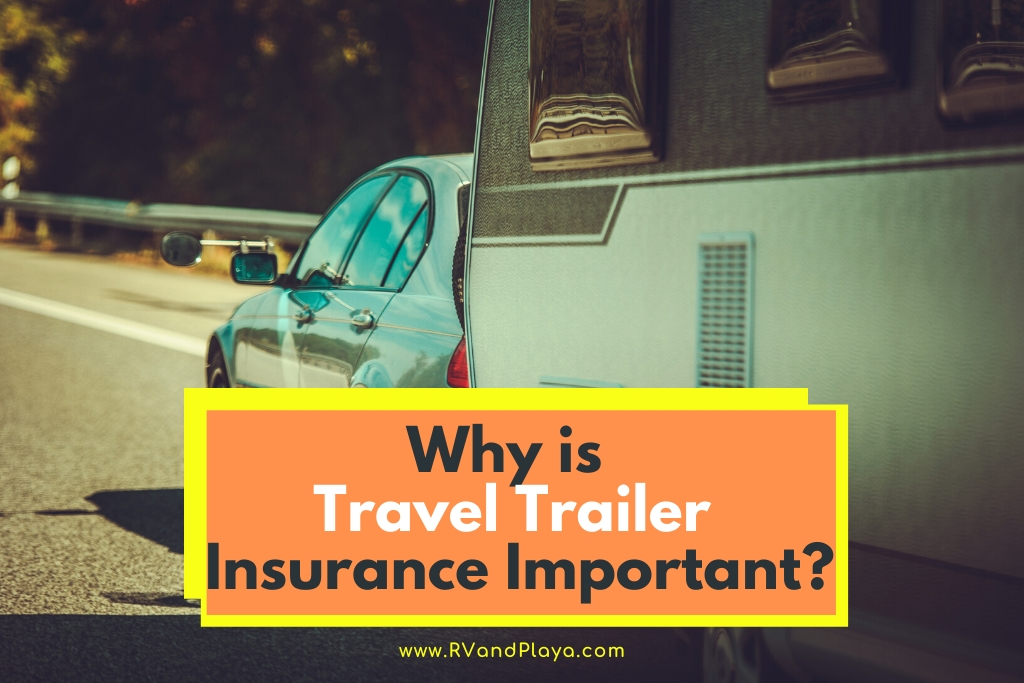A travel trailer is a non-motorized type of recreational vehicle or RV. This is a form of a compact home that you can hitch to your personal vehicle.
Having a travel trailer that you can tow behind your car, SUV, or truck is great if you love to go camping on weekends, go on long rides across the country, or go on outdoor adventures but don’t want to spend a lot of money on hotels.
But do you need to get a travel trailer insurance? You will need a travel trailer insurance to cover both liability and damage to your travel trailer, although you are not legally obligated to get one. A travel trailer insurance is designed to cover the gaps that your auto and home insurance policies do not.
If you have a travel trailer or if you plan on getting one, a travel trailer insurance will benefit you.
But before you avail, you will have to know what makes this type of insurance unique and what really makes it important and necessary.
You should also learn about the options you have in terms of coverage and how state laws will come into play.
Table of Contents
What is Travel Trailer Insurance?
Travel trailer insurance is a type of insurance designed to protect you from the dangers of traveling and living life on the road. But while a travel trailer is a type of RV, a travel trailer insurance is not the same thing as an RV insurance.
Most states require an RV insurance for the following:
- motorhomes or Class A and Class B RVs
- RVs that you do not own outright or whose purchase is financed by a loan you took
- an RV that is a rental vehicle
So, since a travel trailer is non-motorized and is merely towed by your personal vehicle, you are not required by law to purchase an RV insurance.
You can, however, opt to get separate insurance for your travel trailer just to get your bases covered in case something untoward happens.
Since RV is a broad term referring to a bunch of vehicle types, RV insurance is a much broader type of insurance, too.
A travel trailer insurance, on the other hand, is more specialized and is specifically designed to provide coverage for this specific type of non-motorized trailer.
Are Travel Trailers Covered by Auto Insurance?
Your travel trailer is hitched to your personal vehicle and, because of this, your automotive liability insurance may provide limited coverage for your trailer. It may cover some of the costs of damage resulting from an accident involving your trailer.
For your automobile insurance to cover your travel trailer, you have to officially own it. In other words, the trailer has to be registered in your name.
Borrowed or rented travel trailers are not eligible for coverage under your existing auto insurance.
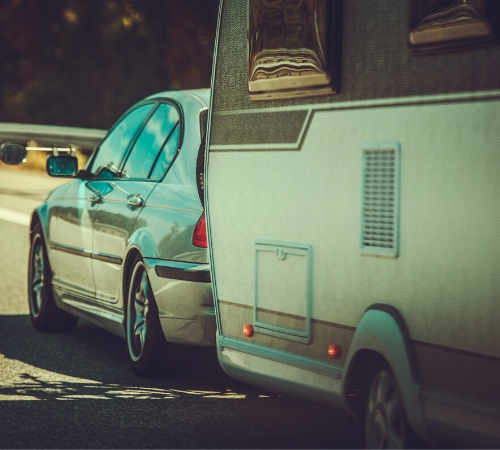
Limitations of Automotive Insurance
In most cases, however, an auto policy only extends its coverage to a travel trailer for liability. It won’t provide coverage to the actual trailer.
This means that your auto insurance will only cover the damage caused by your trailer to another person.
For instance, if your car is towing your travel trailer and the trailer breaks loose and hits the vehicle behind it, your auto insurance would cover any damage done to the other party, up to your limits.
If it is another person that causes damage to your trailer, your auto insurance policy coverage most likely won’t apply.
Additionally, while typical auto insurance policies extend liability coverage to your trailer while on the road, they still do not cover its contents or the personal belongings you have in it.
They also don’t cover items and accessories that are towed behind or attached to your trailers, such as boats, bikes, and smaller recreational vehicles.
Are Travel Trailers Covered by Homeowners Insurance?
People also ask whether their homeowners’ insurance would apply in this case since a travel trailer is a living space, albeit on wheels, as well as a personal property.
Are travel trailers covered by homeowners insurance? Generally, home insurance policies do not always cover travel trailers. Your trailer may qualify as a private property that you own, but because it still does not inhabit a fixed location, coverage can get quite confusing.
And while some homeowners’ insurance policies will allow you to add your trailer as an extra for an additional fee, some specifically exclude trailers.
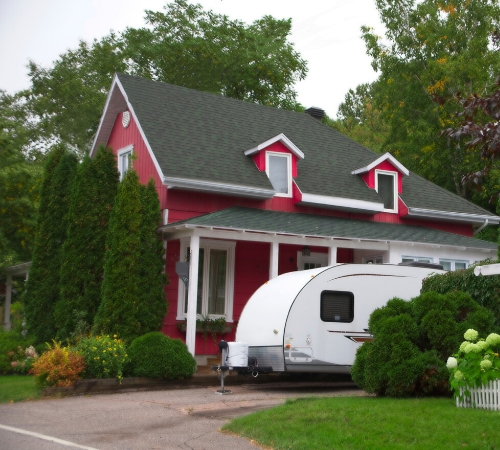
If the Trailer is Parked in Your Property
Moreover, it would also depend on whether your travel trailer is on your property.
Your trailer probably spends its time in your garage when you aren’t using it. And when it’s on your property, it’s probably covered by your homeowners’ policy and it is also considered to be part of your homeowners’ liability.
So, if someone is injured in your trailer while it is parked on your land, your homeowners’ insurance will typically cover the expenses associated with it.
And if your trailer is damaged, your homeowners’ policy will only cover the costs if you have specifically included the trailer on your contents list. Certain possessions stored in the trailer may also be covered as long as they are also included in the content coverage list.
If the Trailer is Not Parked in Your Property
If you store your trailer in a detached garage or shed, it may fall under your home insurance policy’s “additional structures” portion.
It is important to check with your provider or your insurance agent concerning the extent of coverage they will provide.
Make sure to include your trailer and everything in it on your contents list with your insurance agent.
In fact, some insurers will give you a discount if you store your travel trailer in a professional storage unit because that means that it is better protected from theft, weather, and vandalism.
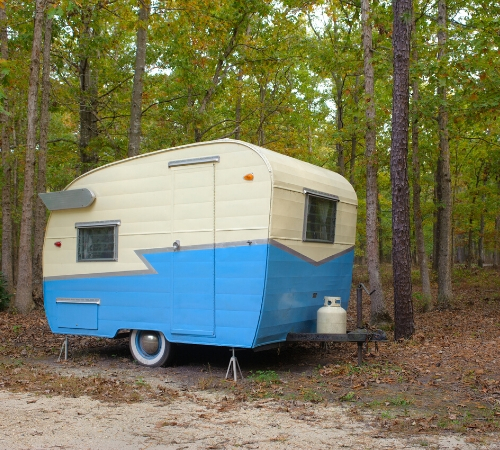
Is Homeowners’ Insurance Enough?
Even if your pre-existing homeowners’ insurance covers your trailer under certain conditions, experts would still advise you against solely relying on it. Instead, they would recommend that you get a separate specialty insurance for your travel trailer.
Part of the problem with merely adding your travel trailer on your pre-existing home insurance policy is that you won’t get the best type of coverage that would protect your investment.
For example, even if your policy reimburses you for the cost of your trailer in case of damage, the amount will still not be equivalent to the full value of your trailer.
Instead, they will reimburse you according to the depreciated value of your trailer based on its fair market value.
What’s more, a typical home insurance policy may cover your possessions inside your trailer, including jewelry, clothing, and even firearms, but it won’t cover the loss or damage of the trailer itself. Well, at least they do not automatically.
The Benefits of Getting a Travel Trailer Insurance
A travel trailer costs between $11,000 and $35,000, and that does not include any upgrade to your current vehicle to make it compatible and fit for towing a trailer.
So, yes, it isn’t exactly cheap, but many people consider it a good investment, especially if the goal is to travel and go on outdoor adventures more often. Ultimately, the money you spend on a trailer will translate to savings as you won’t need to book hotels for your accommodations.
And because a travel trailer is an investment, you would naturally want to protect it. And the best way to do that is to get a travel trailer insurance.
This type of insurance is designed to help you protect your trailer in ways that your existing automotive and homeowners’ policies can’t.
Why Do You Need to Get a Travel Trailer Insurance?
You need to get a type of special insurance for your travel trailer to cover certain risks. For one, RVs, including travel trailers, are significantly larger than your car or any other private vehicle. As such, they are at a bigger risk for on-road damages.
But unlike other types of RVs and motor vehicles, travel trailers cannot be driven and run on their own and are merely hitched to your car. This means they are at risk for towing-related issues and accidents.
An accident that damages your car or SUV, for example, may impair its ability to tow your travel trailer. And damage to your trailer may likewise inhibit your car’s capacity to tow it.
Additionally, because travel trailers are mobile living spaces, they are at more risk for structural damages compared to your home.
Needless to say, having an insurance policy that specifically covers your travel trailer presents a lot of benefits. These benefits include:
- Your travel trailer insurance policy may include towing or roadside assistance. This means you could avoid costly towing fees and you wouldn’t have to abandon your travel trailer on the side of the road while you get help.
- A travel trailer insurance could provide protection against damages from uncontrollable circumstances like strong winds, fire, heavy snowfall, hail, flooding, or even a tree falling on it.
- Automotive liability insurance won’t protect your travel trailer and the personal belongings it contains from acts of human nature, like theft or vandalism. So in case such an act happens and your trailer gets a broken window or some other damage, you wouldn’t have to worry about how to pay for repairs.
- If you are using your travel trailer as a primary residence or as your home for most of the year, a travel trailer insurance will provide you with the same necessary protection as your homeowner policy.
The biggest benefit of purchasing a travel trailer insurance policy, however, is the peace of mind it gives you and your family.
Knowing that you have coverage for anything untoward that may happen and that everything you have invested in – from your trailer to the objects inside – are protected by your insurance policy allows you to sleep soundly at night and to better enjoy your time on the road.
What are the Risks of Going Without Travel Trailer Insurance?
There are some major risks involved when you drive and take your travel trailer to the road without additional insurance. This is because you will never know what could happen once you are out there.
In fact, according to statistics, driving a car is the second most dangerous mode of transportation in the United States, next to driving a motorcycle. This means that traffic-related accidents should never be discounted as impossible.
And because you can never predict such accidents, you can only prepare for the possibility that they may happen to you while you are on your way to a campground or while you’re driving the highway.
Figuring in a road mishap while you’re far away from home may cripple you financially if your travel trailer is not insured.
Even minor damages to your trailer can end up hurting your wallet. Repairs can be costly, not to mention time-consuming. And if you’re miles from home or if you’re in another state, you’d be left in a real tough spot.
Now, if damage to your travel trailer is irreparable or extensive, you may find yourself losing your trailer altogether.
Without insurance, you might just have to write it off as a lost investment and as money down the drain. That is something completely avoidable.
Getting a travel trailer insurance doesn’t mean you are morbid and paranoid or that you continuously think about getting into an accident.
On the contrary, getting one means you are always looking into the future and making sure you achieve your goal of traveling and going on road trips despite whatever mishap you meet.
Instead, you think of trailer insurance as a safety net so that financial setbacks wouldn’t get in the way of you doing what you love to do.
Travel Trailer Insurance: Coverage
Just like any insurance, a travel trailer insurance policy’s coverage, coverage requirements, and premium costs vary. It would depend on which state you’re in, which insurance company you’re with, and what packages are available.
Types of Coverage
When you consider getting a travel trailer insurance, you must know the costs that they cover. Here are the different types of insurance of coverage:
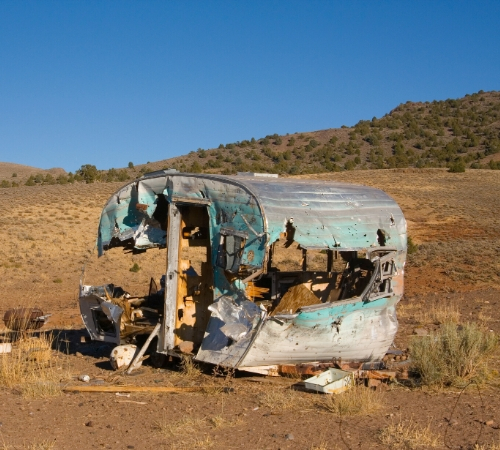
Liability Coverage
As discussed above, liability coverage applies to the costs related to damages caused by you or your trailer to another party while on the road. The damages include bodily injury and property damage. This also covers any legal fees that may result from the accident.
This particular coverage for your travel trailer is often covered by your existing automotive insurance policy. And, in most states, this is the only coverage that is legally required.
Collision Coverage
When you get into a crash or a traffic accident, the collision coverage will take care of the associated costs. This coverage protects the structure of your vehicle, as well as some of its interior features.
This is commonly subject to meeting your insurance deductible.
Campsite and Vacation Liability
This is a specific kind of liability coverage and it protects you in the event someone is injured in or near your trailer while you are parked and not in motion.
Contents Coverage
When you have personal belongings inside your travel trailer, the contents coverage protects the value of these items.
Valuables like jewelry, electronics, and appliances might not be covered under your other insurance policies and these items can be pricey, so you would need this coverage in case of damage to these items or in case of theft.
Medical Payments Coverage
This is a specific coverage that covers medical costs for you if you figure in an accident you have caused. This coverage will also cover your passengers.
Uninsured or Underinsured Coverage
This coverage protects you if a driver who damages your vehicle and your trailer do not have sufficient insurance coverage.
Comprehensive Coverage
Comprehensive coverage helps with damages to your trailer that are not traffic-related or not caused by accidents on the road. This can include theft and damages caused by fire, flooding, extreme weather conditions, vandalism, and damage caused by animals.
Extra Coverage Options
If you plan on spending a significant amount of time in your travel trailer, you may want to take advantage of some additional coverage. These include:
Full-time Coverage
Get the full-time coverage if you live in your trailer full-time and need something more similar to a homeowners’ policy. This one has increased liability or medical payments coverage.
Towing and Roadside Assistance
In case you need help with quick repair and maintenance while you’re on the road, this coverage will come in handy. Some companies offer roadside help 24/7 if your trailer is disabled by towing it to the nearest repair facility.
However, the distance for which you’ll be covered will depend on your policy and your insurance company. You can avail of this assistance in case of a dead battery, mechanical or electrical breakdown, fuel delivery, flat tire, or if you are just stuck in the mud, snow, or sand on the side of the road.
Personal Property Coverage
Consider getting additional insurance coverage for personal property if your trailer contains expensive equipment and other valuable items. You will normally be able to set the personal property coverage amount you would like.
Total Loss Replacement
If you have an expensive travel trailer and it is totaled in a covered accident, the total loss replacement would be useful. This coverage will give you a brand-new replacement trailer, minus your deductible. You will get a model that is within five years’ age of the trailer you are replacing.
Emergency Expense Coverage
If your travel trailer is damaged and is rendered temporarily unlivable, this coverage will pay for additional living expenses. You will, however, need to be more than a certain distance away from your home to avail of this.
What’s Not Covered?
Some items are usually excluded from travel trailer insurance coverage. These include:
- Intentional damage to your trailer.
- Normal wear and tear.
- Damages incurred while your trailer is used in a manner that the policy does not allow, such as using your car and trailer in a race.
Travel Trailer Insurance Costs
The cost of a travel trailer insurance depends on the value of your travel trailer, the size of your trailer, the contents of your trailer, and the state you live in. On average RV insurance cost should total between $200 to $2,000 even with added extras.
Moreover, usage will also be considered. The more you use your trailer, the more you will pay for its insurance. If you live in your trailer, for instance, you are considered more of a risk than someone who uses their trailer just for recreation, and, as such, it will cost more for you.
Your driving experience will also be factored in. More experienced drivers will pay less than new drivers.
The following table shows the average RV Insurance Rates across 6 States:
| States | Insurance rates per year (USD) |
|---|---|
| North Carolina | $875 |
| Oregon | $895 |
| Massachusetts | $1,135 |
| Michigan | $4,485 |
| California | $4,085 |
| Texas | $1,435 |
Other factors considered in the calculation of costs include:
- the make and model of the trailer
- the age and condition of the trailer
- the deductible you choose
- the drivers who are included in the policy
- the limits you set on the policy
- the type of policy you purchase and the additional insurance options you avail of separately
To determine how much trailer insurance premium you will need to pay, you will have to consult with a local independent agent.
Your agent will be able to compare prices from different insurance companies and you can choose the best trailer policy for your needs and at a cost that fits into your budget.
How to Know the Appropriate Cost of a Travel Trailer Insurance
Some travel trailer owners decide to just rely on their automotive and homeowners’ insurance policies and not get a separate one for their trailer due to the cost.
They are paying for their existing auto and home insurance anyway, so why add more out-of-pocket expense for something that is just optional? This thinking is understandable considering that it’s an additional cost.
The thing is, a travel trailer insurance does not really have to be expensive. The costs will differ, depending on the policy’s coverage and the inclusions, and depending on the company providing it.
So there is no fixed amount for it. There are, however, a few tips on how you can make sure you are getting a good deal and that the policy is worth your money.
Here are some pointers:
- Check out forums, message boards, and social media groups for RV enthusiasts, consumer advocate groups, and insurance agents. Ask them questions and gather all the information you need about prices, about reliable insurance providers, and the must-haves and non-negotiables. There are always people in these groups who are always happy to share their knowledge and experience with others.
- Shop around and compare. Take your time and consult with multiple insurance companies. Compare their offerings side by side. Take note of their insurance coverage options and calculate the costs. Pick one that gives you the greatest value for your money.
- Consult with your current insurance agents and talk to them about how you could add your travel trailer to your existing auto and homeowners’ insurance policy. Bundling insurance can help you save money.
Travel Trailer Insurance Discounts
The cost of travel trailer insurance depends on the type of trailer you have, and the coverage options you choose. However, you may enjoy certain discounts, too.
Multi-Policy Discount. If your travel trailer insurance is provided by the same company as your auto policy, you can take advantage of a multi-policy discount.
Paid-in-Full Discount. You can pay your premium upfront if you can afford to. As a result, you get to enjoy a “paid in full” discount and save some money.
Raise Your Deductible. Think about the relationship between your insurance premium and your deductible. If you raise your deductible, you pay a lower premium.
Your rates may also be reduced if you are a non-smoker and if you install additional anti-theft or safety devices in your trailer.
Where Can I Get Travel Trailer Insurance? (Insurance Agency)
If you are looking for the best insurance company for your travel trailer policy, you may want to contact an independent agent.
Your agent will be able to help you determine the appropriate amount of coverage you need, evaluate your risks, and compare plans offered by various insurance providers.
Whether you are just going on holiday with your family or living full-time in your RV, Good Sam Insurance offers a variety of service options when it comes to protecting your RV.
Based on our own experience with Good Sam RV insurance and the feedback we receive from many of our friends, Good Sam is our first choice at the moment.
Good Sam offers you more at a lower price compared to other RV insurance companies we have tested.
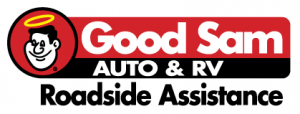
I recently wrote an article on this site called “Is Good Sam RV Insurance Any Good? An Honest Review“. In it, I reviewed the benefits of Good Sam, the disadvantages of Good Sam and i give you some tips for RV Insurance inquiry.
The major insurance companies in the U.S. that offer comprehensive travel trailer insurance policies are:
- Good Sam (Top Choice!)
- RVInsurance.com
- National General
- Farmers
- GEICO
- Progressive
- The Hartford
In the following table you will find the best rated RV insurance providers I have found on the market at the moment (customer services, ratings, coverage options, discounts, financial strength):
| RV Insurance Agency | Coverage Options |
|---|---|
| Good Sam (Top Choice!) | . 96% overall customer satisfaction rating . Customers report average savings of $321 per year . Total-loss replacement for motorhomes and travel trailers . Specialized coverage for full timers or first-time weekend RV’ers . RV storage option allows you to save even more by turning off coverage when your RV is not in use! |
| RVInsurance.com | . Customers report average savings of $321 per year . Covers everything from class A motorhomes to pop-up campers . Quote and buy online . Speak to a professional, licensed agent . Fully licensed, multi-line agency can quote your auto, home, boat and other insurance products |
| National General | . Top rated C=choice: A+ BBB rating . “Turn Off” for liability & collision during storage – Save 53% . Cover your personal belongings or attachments . Full-timer coverage options . Mexico insurance options . Total Loss RV replacement . 24-hour claims support |
| Progressive | . Progressive Insurance – Trusted by Over 18,000,000 . Competitive rates, tons of discounts (safe driver, pay-in-full, multi-car, multi-policy, quoting online & more) . Name your price Tool® . Comprehensive List of RV Covered Items . Roadside Assistance Included . Recreational Vehicles, Trailers & Fifth Wheels |
How to Get the Best Travel Trailer Insurance
Overall, you can get the best travel trailer insurance for your needs at a cost that is most favorable to you by:
- Doing your research about travel trailer insurance and the best insurance companies to work with so you can make the best choices.
- Knowing the type of coverage you need so you can customize your policy.
- Knowing about your claims and the claims procedure.
- Finding tools and tips to better care for your trailer so you could minimize risk.
- Making the most of the available discounts and saving on your premium
Recommended reading
For more helpful articles about RVing please check out our articles below:
Average RV Park Rates: Actual Campgrounds Prices per Night
How Much Does Class B RV Insurance Cost? Complete Buyer’s Guide
4 Reasons RV Insurance Is Expensive [Must-Read]
How Much is it to Buy Back a Totaled RV From Insurance?
Is RV GAP Insurance Worth It? [Guide for Nationwide Camper & RV]
Recent Posts
Is Toyota Remote Connect Free? (Subscription, Services Plans)
Does Toyota Remote Connect have an included trial? It used to be the case that, when you bought a new car, you made one straightforward payment and that was it. Now, it feels like there are...
Toyota Safety Connect: What It Is And Why You Need It? Whether you’re buying a new Toyota or you’ve had one for a while you will have been given the hard sell on their Connected Services but do...

